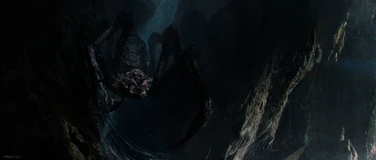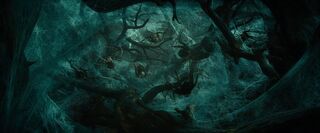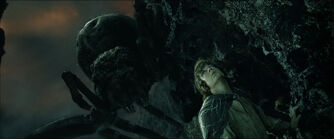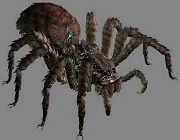Giant, sapient spiders, also known as the Children of Ungoliant, lived in particularly dark and perilous places in Middle-earth. Those who spoke were vicious and malevolent creatures, and their presence was typically considered to be a burden.
Description
These spiders could speak to one another, as shown in The Hobbit. Like Orcs, they detested the light.
They lived in the south of Middle-earth in the First Age, having descended from spider-creatures of the Ered Gorgoroth, but by the Third Age they spread to other areas far away. After the shadow of Sauron fell upon Greenwood the Great, many spiders came and lived there, and the forest became known as "Mirkwood".
History

The first Dark Lord, Melkor, used Ungoliant to help him destroy the Two Trees of Valinor and steal the Silmarils.[1] Ungoliant, who had an insatiable desire to devour light, demanded the Silmarils. Melkor refused and she attempted to kill him. Ungoliant was subsequently driven off by Melkor's Balrogs, and she ultimately wandered across Middle-earth, consuming anything that gave light such as gemstones; and often mated with other large spiders. Her offspring were a great bane on the world in later years. She was described as surrounded by "an aura of darkness". Her fate is unknown, but it is said that, always hungry, Ungoliant ended by devouring herself.[2]
The hobbit Bilbo Baggins and his thirteen Dwarf companions encountered giant spiders in Mirkwood on their Quest to the Lonely Mountain. They managed to capture and entangle each of the Dwarves in their webs (except for Thorin Oakshield who was captured by Thranduil's Elves after the Dwarves intruded on the third and final feast). Only Bilbo's magic Ring and his Elven blade (Sting) allowed them to escape from being eaten.[3]
Frodo Baggins and Samwise Gamgee encountered the lone, giant spider Shelob in her lair, within caves in the Pass of Cirith Ungol, as they were trying to enter Mordor in their quest to destroy the One Ring. Frodo was ambushed by her twice, and paralyzed by her poison on the second encounter.[4] Sam used Sting to attack Shelob and wound her, which caused her to flee.[5] Her fate is unspecified.
Influence of spiders in Tolkien's life
Contrary to popular belief, the reason that Tolkien featured spiders so prominently in his stories was not because he was bitten by a tarantula when he was young, but rather because his son was afraid of them. From this they are portrayed negatively, always appearing as antagonists.

In adaptations
In The Hobbit 1966 animated film
In The Hobbit, the Dwarves and Bilbo are captured by giant Mirkwood spiders. Unlike in the books, these spiders can speak plainly without Bilbo putting on the Ring. They are voiced by Jack DeLeon. Also, Thorin Oakenshield is captured as well by spiders (as also in The Hobbit trilogy), while in the book Thorin was captured instead by Thrauduil's Elves.
In The Lord of the Rings (1978)
Shelob is not shown, but only mentioned briefly by Gollum towards the end of the The Lord of the Rings.

In The Hobbit film trilogy
Giant spiders appear briefly in The Hobbit: An Unexpected Journey, where they are seen attacking Radagast's home in Rhosgobel, only to retreat back into the forest, seemingly repelled by his magic. Radagast later tells Gandalf that they came from Dol Guldur.
In The Hobbit: The Desolation of Smaug, the spiders capture the Dwarves in Mirkwood. As in the book, the spiders are capable of speech that Bilbo can understand when he is wearing the One Ring. They were voiced by Brian Sergent and Peter Vere-Jones in the film. There are also large ghostly-white spider-like creatures that lived below the trees in Mirkwood. These creatures live underground, and emerge from trapdoor-like lids. When Bilbo Baggins falls from the trees when killing a spider in Mirkwood, he loses the One Ring. As he goes to retrieve it, a crab-like spider emerges and walks over the Ring in front of Bilbo. But before it is able to strike, Bilbo (who is aggressively drawn to the ring) severs one of its mandibles with Sting, and stabs its underside. The creature collapses, and he kills it by striking its head.

In The Lord of the Rings film trilogy
The capture of Frodo by Shelob and her battle with Sam are depicted in the film The Lord of the Rings: The Return of the King.


In video games
- Giant spiders appear in many Lord of the Rings video games, including The Lord of the Rings: The Return of the King.
- In The Battle for Middle-earth II and its expansion, "Spiderlings" are a unit of the Goblin faction; Shelob also appears as one of their heroes. The Goblin faction has a "spiderling lair" fortress extension that spawns smaller spiders that attack nearby enemies. Goblins may also ride them, as Spider-rider units.
- For The Hobbit: The Prelude to The Lord of the Rings three spiders were invented named Wicked, Wild, and Wrath. These three spiders are the queens of the Spiders of Mirkwood and are three of the bosses of the Flies And Spiders level.
- The Lord of the Rings: War in the North features a giant spider named Saenathra, who takes Radagast captive, and must be defeated for Radagast to be freed. Like the Mirkwood spiders in The Hobbit, Saenathra can speak.
- In LEGO The Lord of the Rings: The Video Game, the player must go through Shelob's Lair and kill at least six small spiders bearing Sauron's mark on their back.
- In The Lord of the Rings: Gollum there are spiderlings (children of Shelob) that live underneath Barad-dûr. Gollum has to outmaneuver them in order to escape. These spiderlings are depicted as pale with a furry body.
Translations
| Foreign Language | Translated name |
| Afrikaans | Groot spinnekoppe |
| Albanian | Marimanga të mëdha |
| Amharic | ታላላቅ ሸረሪዎች |
| Arabic | العناكب |
| Azerbaijani | Böyük Hörümçəklər |
| Belarusian Cyrillic | вялікія павукі |
| Bengali | গ্রেট মাকড়সা ? |
| Bulgarian Cyrillic | Големи паяци |
| Catalan | Grans Aranyes |
| Cebuano | Dakong kaka |
| Chinese (Hong Kong) | 巨形蜘蛛 |
| Croatian | Veliki Pauci |
| Czech | Velicí Pavouci |
| Danish | Store edderkopper |
| Dutch | Grote Spinnen |
| Esperanto | Grandaj Araneoj |
| Finnish | Suuret Hämähäkit |
| French | Grandes Araignées |
| Galician | Grandes Arañas |
| German | Riesenspinnen |
| Georgian | დიდი ობობები |
| Greek | Μεγάλη αράχνη |
| Gujarati | ગ્રેટ કરોળિયા |
| Hebrew | עכבישים ענקיים |
| Hindi | महान मकड़े |
| Hmong | Zoo kawg thiab kab laug sab. |
| Hungarian | Nagy Pókok |
| Indonesian | Laba-laba besar |
| Irish Gaelic | Damháin alla mór |
| Italian | Randi Ragni |
| Japanese | すごいクモ類 |
| Kazakh | Ұлы өрмекшілер (Cyrillic) Ulı örmekşiler (Latin) |
| Korean | 거미 |
| Latin | Magna Aranearum |
| Latvian | Liels Zirnekļi |
| Laotian | ແມງມຸມທີ່ຍິ່ງໃຫຍ່ ? |
| Lithuanian | Didžiosios Vorai |
| Macedonian Cyrillic | големи пајаци |
| Malaysian | Labah-labah Gergasi |
| Marathi | कोळी |
| Maltese | Brimb Kbira |
| Norwegian | Stor edderkopper |
| Pashto | لوی ماډلونه |
| Persian | عنکبوت ها |
| Polish | Wielkie Pająki |
| Portuguese | Grandes Aranhas |
| Romanian | Marii Păianjeni |
| Russian | Гигантские пауки |
| Serbian | Велики Пауци (Cyrillic) Veliki Pauci (Latin) |
| Sicilian | Ragni |
| Sinhalese | මහා මකුළුවන් |
| Slovak | Veľké pavúky |
| Slovenian | Super pajki |
| Spanish | Grandes arañas |
| Swahili | Buibui Kubwa |
| Swedish | Stora spindlar |
| Tamil | கிரேட் சிலந்திகள் |
| Thai | แมงมุมที่ยิ่งใหญ่ |
| Turkish | Büyük Örümcekler |
| Urdu | عظیم مکڑیاں |
| Uzbek | Буюк ўргимчаклар (Cyrillic) Buyuk o'rgimchaklar (Latin) |
| Welsh | Corynnod mawr |
| Yiddish | גרויס ספּידערס |
|
Races of Arda
Ainur (Valar & Maiar) | Dwarves | Elves | Ents | Great Eagles | Hobbits | Huorns | Men | Petty-dwarves | Skin-changers (Beornings) Servants of the Shadow:
Barrow-wights | Ettens | Dragons (Fire-drakes & Cold-drakes) | Ogres | Orcs (Uruk-hai) | Spiders | Trolls | Úmaiar (Balrogs) | Úvanimor | Vampires | Wargs | Werewolves |
References
- ↑ The Silmarillion, Quenta Silmarillion, Chapter VIII: "Of the Darkening of Valinor"
- ↑ The Silmarillion, Quenta Silmarillion, Chapter IX: "Of the Flight of the Noldor"
- ↑ The Hobbit, Chapter VIII: "Flies and Spiders"
- ↑ The Lord of the Rings, The Two Towers, Book Four, Ch. IX: "Shelob's Lair"
- ↑ The Lord of the Rings, The Two Towers, Book Four, Ch. X: "The Choices of Master Samwise"
